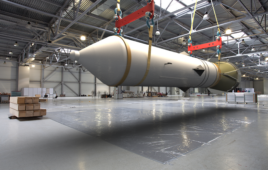Like a classic car being restored, the research vessel (R/V) Roger Revelle is undergoing a year-long makeover to extend its working life, enhance its operating systems, and strengthen its research capabilities for the Navy and scientific organizations.
The Scripps Institution of Oceanography, at the University of California San Diego, has operated and maintained the U.S. Navy-owned Revelle since 1996, under a charter lease agreement with the Office of Naval Research (ONR)—which manages the ship on behalf of the service.
“This refit of the R/V Revelle is important because it bolsters the scientific and seagoing capabilities of a true workhorse of a ship,” said Dr. Tom Drake, head of ONR’s Ocean Battlespace and Expeditionary Access Department.
The Revelle usually spends more than 250 days at sea yearly.
“The refit will allow the Revelle to continue to support Navy and national oceanographic research objectives,” Drake continued. “It also enables additional years of service; hundreds of thousands of ocean miles sailed; research opportunities for thousands of scientists; and the training of the next generation of sea-going scientists and technicians.”
During the mid-life refit—conducted in Portland, Oregon, by Vigor Shipyard—the Revelle will receive brand-new diesel engines that run cleaner and more efficiently. The 273-foot vessel will boast the latest navigation and ship-positioning systems—as well as sophisticated sonar, allowing it to map the ocean floor in sharper detail.
The Revelle’s laboratories will be updated to include advanced IT infrastructure and improved real-time communications with shore. Several critical sensor systems also will be replaced, providing upgraded scientific capabilities and increased reliability.
The $52 million refit—sponsored by ONR, Scripps and the National Science Foundation—is a much better price tag than the $200 million it would have cost to build a new research vessel. And it will extend the Revelle’s life by another 15-20 years.
“Boosting the ship’s capabilities, while keeping the costs relatively low, is of great value to the Navy, the scientific community and the U.S. taxpayer,” said Rob Sparrock, the program officer overseeing ONR’s research vessel program. “For example, the refit will update the propulsion systems with the newest in marine technology. This means better diesel-electric generation and distribution systems, stronger compliance with environmental requirements, and reduced obsolescence of various systems and components.”
The Revelle is one of three Navy-owned research vessels undergoing refit. The R/V Thomas G. Thompson, operated by the University of Washington since 1991, completed its refit in 2018. The R/V Atlantis, operated by the Woods Hole Oceanographic Institution since 1997, is scheduled for refit in 2020.
“The Revelle belongs to a class of research vessels that can do things few other research ships can do,” said Stephen Kelety, marine superintendent at Scripps. “It can accommodate a large number of scientists and scientific equipment, operate in bad weather and high seas, and is adaptable to the research needs of the scientists onboard. It’s an important vessel for gathering scientific knowledge.”
Since the end of World War II, the Navy has provided state-of-the-art research ships to select universities and oceanographic institutions to perform scientific studies of the marine environment. Currently, the Navy owns six of these vessels—part of the U.S. Academic Research Fleet, whose research at sea supports Navy and national oceanographic research objectives and trains the next generation of oceanographers.
The Revelle is named for Roger Revelle, a Navy officer who was instrumental in the founding of ONR and was among the first scientists to study climate change and the movement of the Earth’s tectonic plates.
Filed Under: Aerospace + defense




